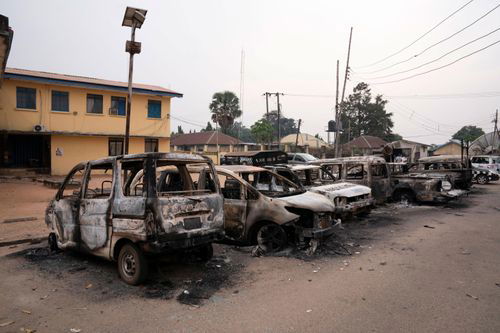Nigeria’s President Buhari describes prison break which freed nearly 2000 inmates as ‘act of terrorism’

Nearly 2000 inmates broke free from a prison in southeast Nigeria Monday after armed men invaded the site and used explosives to blast parts of the prison, authorities said.
Six of the 1,844 inmates who escaped from the Owerri Custodial Centre, Imo State, have voluntarily returned, according to a spokesman for the Nigerian Correctional Service.
Thirty-five others chose not to abscond during the attack, authorities said.
“The attackers who stormed the facility at about 0215hrs on Monday 5th April, 2021, gained entrance into the yard by using explosives to blast the administrative block,” said Francis Enobore, spokesman to Nigerian prison service.
The Nigeria Police Force has blamed outlawed secessionist group, the Indigenous People of Biafra (IPOB) and its paramilitary wing, the Eastern Security Network (ESN) for the attack.
The police said the gunmen, who had also stormed the Force headquarters in the state, were armed with a variety of sophisticated weaponry and military hardware.
“The attempt by the attackers to gain access to the Police armoury at the Headquarters was totally and appropriately resisted by Nigeria Police Force,” the force said in a statement Monday, adding that no lives were lost in the incident.
President Muhammadu Buhari, who is currently on a medical visit to the United Kingdom, described the simultaneous attacks as “an act of terrorism,” in a statement posted by his spokesman Garba Shehu.
Buhari also directed the country’s law enforcement agencies to apprehend fleeing inmates, and arrest the perpetrators who “are believed to be deadly criminals,” the President said.
Nnamdi Kanu, leader for separatist group, IPOB, has denied the organization’s involvement in the attacks.
He told CNN: “We have no hand in what transpired in Owerri, Imo State. Having said that, we do recognize and acknowledge the anger, resentment and a sense of injustice being felt by many people — especially the young ones,” he said.
“So what’s happening now is people trying to avenge the death of their loved ones at the hands of the Nigerian security services. Some people, I believe, took it upon themselves to say ‘enough is enough. Anywhere that a government allows injustice to fester, they’re only inviting anarchy, Kanu added.
IPOB was proscribed and designated a terror organization in 2017 by the Nigerian government after its persistent demands for independence fueled periodic clashes with security forces — leading to loss of lives.
The Buhari regime has continued to clampdown on IPOB’s activities, fearing that an escalation of secessionism — particularly in the group’s strongholds in Eastern Nigeria may engineer another Nigeria-Biafra civil war.
In a 2016 report, Amnesty International accused Nigerian security forces of masterminding the killing of dozens of unarmed pro-Biafra protesters. The claims were denied by the Nigerian army at the time.
In 1967, a high-ranking military officer — Chukwuemeka Odumegwu Ojukwu — led the breakaway republic of Biafra, a secessionist state carved out from Nigeria’s southeast.
It led to a bitter civil war from 1967 to 1970 and more than one million people died of starvation in the aftermath of the war.